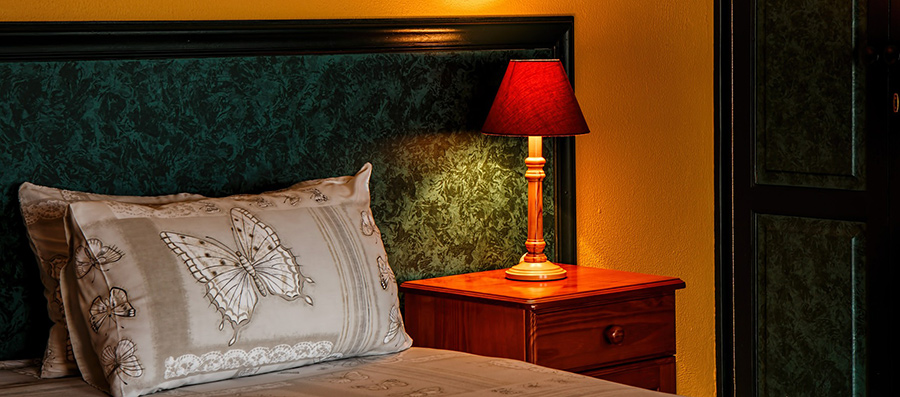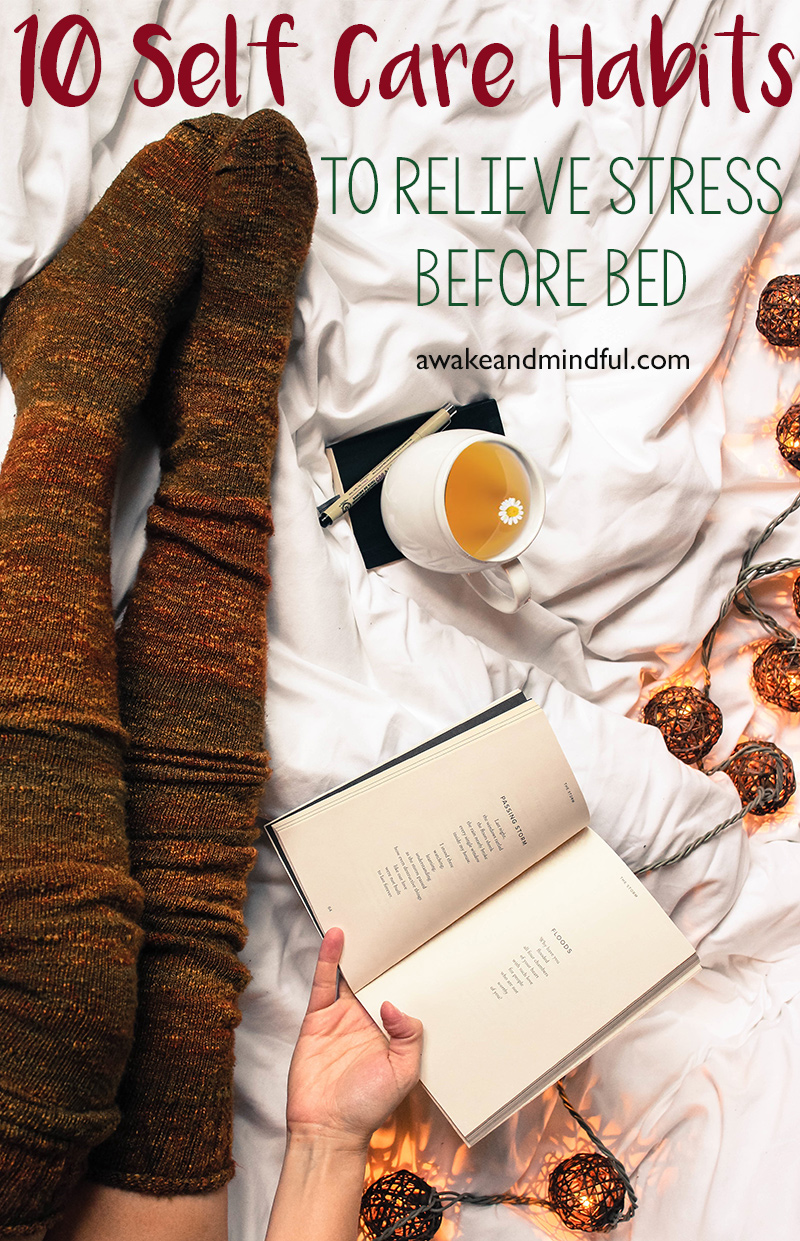10 Self Care Habits to Relieve Stress Before Bed
We all know that terrible feeling: you’ve had a hectic non-stop day, your mind is racing a mile a minute, and your to-do list somehow grew longer. Maybe your boss has been on your case about a new project or the kids have so many activities going on you barely have time for yourself. All of this stress can really wear on your body, you can often feel it draining your energy on frantic days.
Self-care is so important, especially when you’re busy and your attention is focused on everything except for taking care of yourself. At the end of the day, as you’re winding down before bed, is the perfect time to practice self-care. A relaxing routine will help you relieve stress, prepare for restful sleep, and reduce tension in your body. I recommend incorporating these 10 easy habits into your nightly routine. This will help you set aside time for self-care as well as transition your body and mind from your busy day to a calm night of sleep.
1. Unplug
You’ve probably spent all day checking email, sitting in front of a computer, or glued to your smartphone. You need to unplug. Not only do the light waves from your phone, tablet, or laptop disrupt sleep, but constant alerts, text messages, and emails make it difficult for your mind to wind down and relax.
Even if you’re someone who brings work home with them or you have school work to finish, there is a point at night where you need to cut yourself off to focus on “me time.” Banish your smartphone and computer from the bedroom. If you can’t do that, schedule an automatic “Do Not Disturb” to keep alerts at bay (don’t worry, emergency calls can still come through!). Focus pre-bedtime on reading, listening to music, or talking with your partner or children. You should definitely “unplug” before you start the rest of the self-care steps below. No social media. No email. No alerts. Just “me-time.”
2. Dim the Lights

To help transition yourself to sleep, you want to say goodbye to the harsh light of the day. If your bedroom doesn’t have a dimmable overhead light, a few bedside lamps are an awesome alternative. It’s recommended that you dim the lights an hour before bedtime. Light and dark are an important part of setting our internal clocks, which is why it’s good to be exposed to bright light in the morning. Dimmer light and darkness sends a signal to your body that it is time to sleep. If you build dimming the lights into your nightly self-care routine, it will be a clear transition point for your body and your mind that now it’s time to relax and prepare for sleep.
3. Drink Some Tea
There’s nothing more comforting to me than a steaming cup of tea. And while caffeinated teas will wake you up, the right herbal teas will help you relax and maybe make you feel a little sleepy. Look for teas with ingredients like chamomile, valerian root, and lavender. Chamomile is especially helpful for calming indigestion and upset stomachs. The herbs will help you relax while the tea hydrates you.
Make sure to enjoy your tea at least an hour before bedtime to avoid waking up in the middle of the night for a bathroom break.
4. Pamper Yourself
If brushing your teeth and splashing some water on your face is the extent of your nightly cleansing routine, consider adding a little extra pampering before bed. Light some candles or use some essential oils to create a calming atmosphere. Seek out relaxing scents like lavender or chamomile. Turn on some of your favorite music or a podcast you enjoy. Consider taking a warm bath or shower, which will relax your body and help you fall asleep.
If you don’t have time for all that, just develop a little routine to pamper yourself. A skincare routine is a great way to feel like you’re treating yourself. Wash your face with a gentle cleanser, use products that address any skin issues you have, and finish up with a serum, face oil, or moisturizer. This will leave you feeling fresh and give you a physical act to “wash away” the stress of the day. (Learn how to build a skin care routine.)
Since I have dry skin, I enjoy taking time to apply lotion all over my body, especially if I’ve just showered. It makes a nice transition step to slipping on my PJs. This is a great time to use a sheet mask, paint your nails, or do any other little beauty routines you typically don’t have time for.
5. (Self) Massage
Massage is a glorious way to release tension in the body and relax at the end of the day. If you have a willing partner, you may be able to convince them to give you a gentle shoulder and neck massage in the evening. If not, a self-massage is a fantastic option to help you relax and give your body a little love. A nice scalp massage, as well as working the neck and shoulder muscles will feel so good after a day of tension and stress or being chained to your desk all day. A foot rub also feels particularly delicious after a long day on your feet.
Try following along with this self-massage to soothe yourself to sleep:
6. Read
I said before that reading is a great alternative to scrolling through social media before bed or watching TV. Reading a lighthearted novel or an interesting non-fiction book before bed is a great way to unwind and leave the day behind. Since reading engages your mind completely, it will help you forget any of the stresses and worries from the day as you escape into the world of your book.
Reading always makes my eyes feel a bit droopy and is the perfect bedtime activity. Make sure to avoid reading the news or any books that may stress you out.
7. Do Puzzles
If reading isn’t your thing, consider doing puzzles and other mental exercises before bed. Crosswords and Sudoku are particularly good for this. They are low energy activities you can do in bed that engage your mind and leave behind your stresses. They’re also good for your longterm health as they keep your brain working as you age, improving memory and function.
8. Get Intimate

If you’re in a relationship, connecting with your partner emotionally and physically before bed can help you unwind and relieve stress. When you’re both busy, it’s easy for your connection to become strained or forgotten. Take a few minutes to talk, whether to share moments from the day or unload worries or anxieties. Make sure to physically connect as well, either by holding hands, massaging each other, or just cuddling. If you’re in the mood, a little sex before bed is a fantastic way to relieve stress and tension and often induces sleep.
If you’re single, a little self-love before bed can help you peacefully drift off to sleep as well.
9. Journal
If you’ve never journaled before, you’re missing out on a powerful tool. By recording thoughts, memories, emotions, or even just jotting down all those to-dos for the next day, you allow yourself extra time to process emotions, compartmentalize stresses and anxieties, and clear your brain of any worries floating around.
Journaling can be as simple as just using a pen and a spiral notebook or you can go all out with a fancy journal or even take notes on your phone (before you unplug for the day!). Whatever format you choose it up to you and may change based on what’s happening in your life. Make a record of the day, make lists, free write whatever comes to your mind, or focus on issues and emotions you’re trying to deal with.
The act of writing can help reduce stress and calm an anxious mind. One thing I like to do when I’m feeling stressed out about upcoming tasks is to make a list of everything that needs to be done the next day. That allows me to transfer all those worries to a piece of paper and get them out of my brain so I can relax to go to sleep.
10. Meditate
I put meditation last because for many people this is the last thing they do before bed. If you don’t already meditate regularly, I recommend giving it a try before bedtime. Meditation has tons of benefits, like lowering your blood pressure, reducing stress, and relieving anxiety. It’s a great habit for people who struggle with falling asleep or suffer from insomnia.
Focusing your attention during meditation helps you to let go of the stresses of the day and set aside any worries for tomorrow. It’s a fantastic way to transition your mind from busy mode to relaxed mode. Learn how to meditate before bedtime. If you struggle with meditation, these guided meditations for sleep will really help you.
Take the suggestions above and create your own pre-bed self-care routine. Make sure to follow the steps each night, which will help you keep stress in check. Keeping the same habit will also help signal to your body when it’s time to relax and sleep, helping you keep consistent bedtimes while making sure you’re getting enough sleep every night.
Share on Social Media


